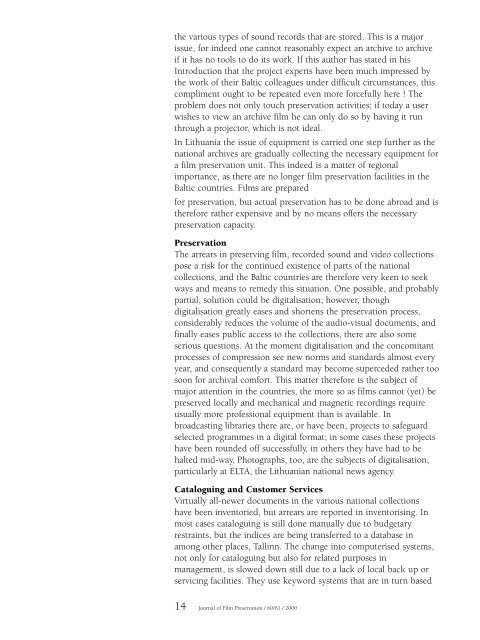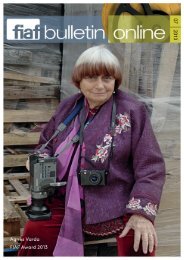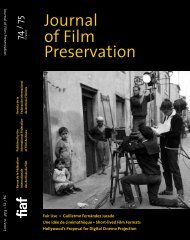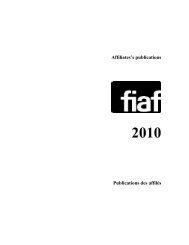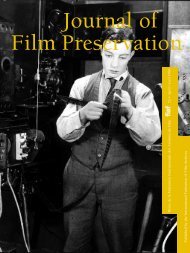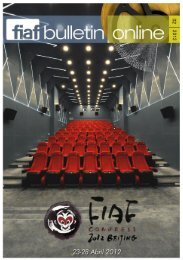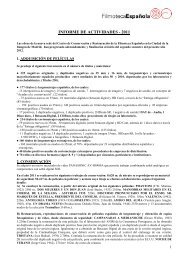Journal of Film Preservation N° 60/61 - FIAF
Journal of Film Preservation N° 60/61 - FIAF
Journal of Film Preservation N° 60/61 - FIAF
You also want an ePaper? Increase the reach of your titles
YUMPU automatically turns print PDFs into web optimized ePapers that Google loves.
the various types <strong>of</strong> sound records that are stored. This is a major<br />
issue, for indeed one cannot reasonably expect an archive to archive<br />
if it has no tools to do its work. If this author has stated in his<br />
Introduction that the project experts have been much impressed by<br />
the work <strong>of</strong> their Baltic colleagues under difficult circumstances, this<br />
compliment ought to be repeated even more forcefully here ! The<br />
problem does not only touch preservation activities; if today a user<br />
wishes to view an archive film he can only do so by having it run<br />
through a projector, which is not ideal.<br />
In Lithuania the issue <strong>of</strong> equipment is carried one step further as the<br />
national archives are gradually collecting the necessary equipment for<br />
a film preservation unit. This indeed is a matter <strong>of</strong> regional<br />
importance, as there are no longer film preservation facilities in the<br />
Baltic countries. <strong>Film</strong>s are prepared<br />
for preservation, but actual preservation has to be done abroad and is<br />
therefore rather expensive and by no means <strong>of</strong>fers the necessary<br />
preservation capacity.<br />
<strong>Preservation</strong><br />
The arrears in preserving film, recorded sound and video collections<br />
pose a risk for the continued existence <strong>of</strong> parts <strong>of</strong> the national<br />
collections, and the Baltic countries are therefore very keen to seek<br />
ways and means to remedy this situation. One possible, and probably<br />
partial, solution could be digitalisation; however, though<br />
digitalisation greatly eases and shortens the preservation process,<br />
considerably reduces the volume <strong>of</strong> the audio-visual documents, and<br />
finally eases public access to the collections, there are also some<br />
serious questions. At the moment digitalisation and the concomitant<br />
processes <strong>of</strong> compression see new norms and standards almost every<br />
year, and consequently a standard may become superceded rather too<br />
soon for archival comfort. This matter therefore is the subject <strong>of</strong><br />
major attention in the countries, the more so as films cannot (yet) be<br />
preserved locally and mechanical and magnetic recordings require<br />
usually more pr<strong>of</strong>essional equipment than is available. In<br />
broadcasting libraries there are, or have been, projects to safeguard<br />
selected programmes in a digital format; in some cases these projects<br />
have been rounded <strong>of</strong>f successfully, in others they have had to be<br />
halted mid-way. Photographs, too, are the subjects <strong>of</strong> digitalisation,<br />
particularly at ELTA, the Lithuanian national news agency.<br />
Cataloguing and Customer Services<br />
Virtually all-newer documents in the various national collections<br />
have been inventoried, but arrears are reported in inventorising. In<br />
most cases cataloguing is still done manually due to budgetary<br />
restraints, but the indices are being transferred to a database in<br />
among other places, Tallinn. The change into computerised systems,<br />
not only for cataloguing but also for related purposes in<br />
management, is slowed down still due to a lack <strong>of</strong> local back up or<br />
servicing facilities. They use keyword systems that are in turn based<br />
14 <strong>Journal</strong> <strong>of</strong> <strong>Film</strong> <strong>Preservation</strong> / <strong>60</strong>/<strong>61</strong> / 2000


